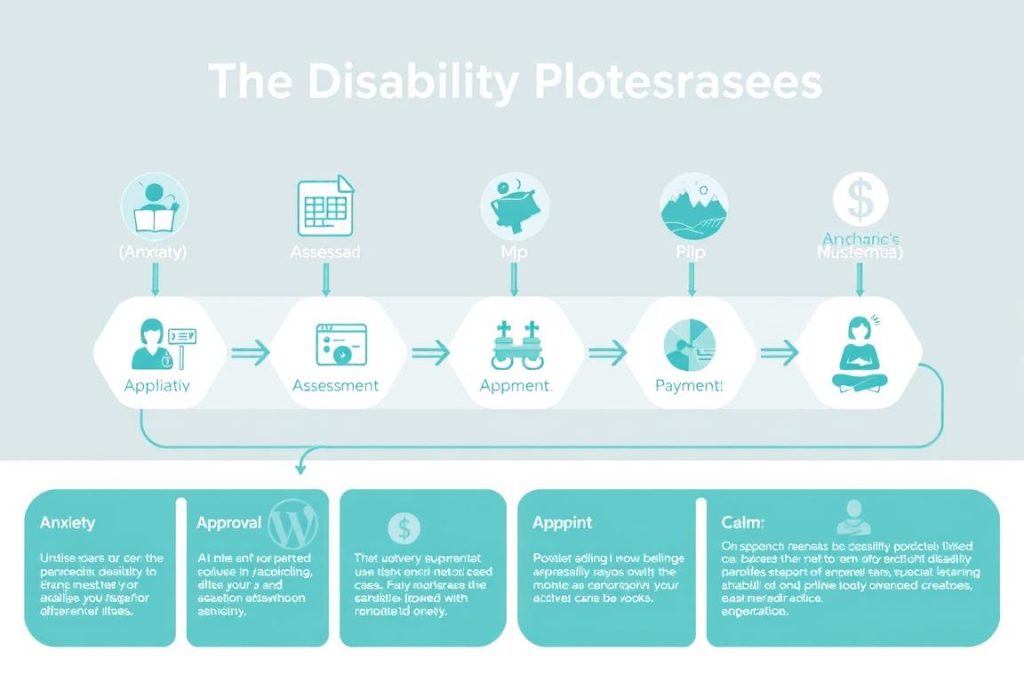Picture this: you’re feeling a wave of relief. But it’s not from meditation. It’s knowing that help for mental health is close by. For many dealing with anxiety, there’s good news. You can get better and have financial aid too. The Social Security Administration (SSA) understands how hard Generalized Anxiety Disorder (GAD) and Panic Disorder can make life and work. They offer disability benefits to make things easier. In 2022, over 2.2 million workers with mental issues like anxiety got help12. And you could be next.
Starting this process can be tough. Only about 20% of first-time disability applications are approved1. It’s easy to feel downhearted. But those who keep going and appeal often win their cases. More than half get approved1. With an average disability payment of $1,343.88 for mental disorders in 202212, and the chance to increase it to $3,82212, knowing the ropes is crucial. It can open the door to the support you need.
Key Takeaways
- Recognizing anxiety as a disability can lead to substantial financial support.
- Mental health benefits, such as SSDI and SSI, offer critical income for those unable to work due to anxiety disorders.
- Preparation and strong medical documentation are crucial to a successful disability claim.
- It’s a marathon, not a sprint—appealing often leads to approval for benefits.
- Even with an overwhelming system, the potential to receive up to $3,822 per month offers a strong incentive to apply.
- Support isn’t just a number; it’s about improving your emotional wellbeing and quality of life.
- Persistence pays, as reflected by the increase in approvals upon appeal.
Understanding Disability Benefits for Anxiety Disorders
It’s crucial to recognize the struggles of people with anxiety disorders. Disability benefits in the U.S. help many dealing with mental health, particularly anxiety disorders.
Is Anxiety Recognized as a Disability?
Anxiety disorders are seen as disabilities by the Social Security Administration (SSA) and the Americans with Disabilities Act (ADA). They’re recognized if they majorly impact mental functions and daily life.
How the Social Security Administration Defines Anxiety
The SSA lists clear criteria to identify anxiety as a disability. Symptoms should greatly affect someone’s ability to understand, interact, and manage daily tasks. Key symptoms include restlessness and trouble focusing, and they must last at least two years3.
Common Types of Anxiety Disorders Covered
The SSA recognizes various anxiety disorders, like generalized anxiety, panic disorder, and social anxiety. These conditions can make daily tasks and work hard. Often needed are flexible hours, breaks, or workspace changes to help manage symptoms.
| Anxiety Disorder Type | Common Symptoms | Required Accommodations |
|---|---|---|
| Generalized Anxiety Disorder | Excessive worry, Fatigue, Sleep disturbances | More frequent breaks, Flexible scheduling |
| Panic Disorder | Panic attacks, Agoraphobia, Difficulty concentrating | Leave for therapy, Changes to workspace |
| Social Anxiety Disorder | High levels of anxiety in social situations, Muscle tension, Irritability | Quiet workspace, Access to mental health resources |
Knowing about these disorders helps set realistic expectations for applying. Application can take as long as nine months and may initially be denied4. Yet, securing mental health benefits is vital. It greatly improves life quality and financial security in hard times3.
Benefits for Mental Health Conditions: Navigating the Application Process
Getting to grips with the psychological health perks of disability benefits can be tough. Yet, knowing what steps to take makes things easier. If you have mental health issues, you might get up to $3,822 every month through programs like Social Security Disability Insurance (SSDI) and Supplemental Security Income (SSI)56.
Key to getting these benefits is showing how much your condition affects your work and daily life6. You must provide detailed medical proof. This proves the seriousness of your condition and how it limits your functionality5.
It’s important to note, many first applications are denied; more than half, actually6. Don’t give up though. Getting help from a legal expert can really boost your odds of winning.

| Disorder Type | Qualifies for Benefits | Key Symptoms |
|---|---|---|
| Neurocognitive Disorders | Yes | Memory loss, impaired reasoning |
| Anxiety Disorders | Yes | Excessive worry, restlessness5 |
| Depressive, Bipolar Disorders | Yes | Mood swings, persistent sadness |
| Schizophrenia Spectrum | Yes | Delusions, hallucinations5 |
Follow the Social Security Administration’s rules carefully when you apply56. Make sure your medical records are up to date and thorough. This isn’t just about recognizing your difficulties. It’s about getting support to better maintain and even improve your life. This support really focuses on boosting your mental wellness advantages.
Key Factors Influencing Your Disability Benefit Amount
When you apply for disability benefits for mental health issues like anxiety, it’s key to know what might change the amount you get. Mental health benefits can be quite large because these conditions seriously affect people’s lives every day.
Criteria for Determining Disability Based on Anxiety
The process to assess anxiety disorders for disability benefits is thorough. Anxiety and obsessive-compulsive disorders fall into one of 11 categories for review. The SSA requires certain medical and functional standards to be met. This includes showing big challenges in adapting or managing oneself7. Knowing these criteria helps strengthen your application and improve your chance of approval.
Documenting Your Condition: The Importance of Medical Proof
To meet the SSA’s strict guidelines, detailed medical records are crucial. Your documents should show how anxiety limits your work efficiency and daily life management. Stronger medical proof raises your chance of getting the most support. Accurate health records showing your condition’s impact are key to a successful claim.
The Maximum Monthly Benefits You Could Receive
People with anxiety disorders could get up to $3,822 each month7. This highlights why a well-documented claim matters. Good evidence not only backs your claim but also helps you get the maximum legal support.
Stay informed and prepared. For more on the disability determination process, check out this helpful link on disability evaluation under Social Security.
| Category | Examples of Disorders | Key Evaluation Criteria |
|---|---|---|
| Anxiety Disorders | Social Anxiety, OCD, Panic Disorder | Marked limitations in adapting or managing oneself |
| Depressive, Bipolar Disorders | Major Depression, Bipolar Disorder | Extreme limitation in maintaining social functioning |
| Schizophrenia Spectrum Disorders | Schizophrenia, Schizoaffective Disorder | Documented persistence of symptoms |

It’s important to consider how job market conditions affect disability claims. Studies show more claims happen when unemployment is high. This suggests economic factors also impact mental health support benefits.
Conclusion
Managing mental health is constantly changing. Getting disability benefits for anxiety isn’t just about money. It’s about finding a better way to feel good every day. With up to $3,822 monthly, people can really focus on getting better. Things like exercise, better food, friends, and relaxation can make a big difference8.
This isn’t just a guess. Studies show people with strong mental health recover better. If you feel okay or are getting better, you have a good chance to beat mental illness. Support is key9. Good news for those struggling: help and hope are real. It’s about getting the right help early and stopping problems before they start10.
The facts are clear: we need to pay more attention to getting disability benefits and boosting our mental health care. Smart, caring strategies can make life better for everyone. This means more than just feeling okay; it’s about making positive changes for all of us. Knowing what help you need and going for it can guide you through the tricky parts of mental health and lead to true happiness and stability10.
FAQ
Is Anxiety Recognized as a Disability?
How Does the Social Security Administration Define Anxiety?
What are the Common Types of Anxiety Disorders Covered?
What Constitutes Adequate Medical Proof for a Disability Claim Based on Anxiety?
What Are the Maximum Monthly Benefits I Could Receive?
How Do I Navigate the Application Process for Disability Benefits Due to Anxiety?
What Criteria Are Used to Determine Disability Based on Anxiety?
How Do Mental Health Support Benefits Influence Emotional Wellbeing?
Can I receive disability benefits for mental health conditions other than anxiety?
What should I do if my application for mental health support benefits is denied?
Are there additional resources that can help me manage my anxiety as I wait for my disability benefits?
Source Links
- Is Anxiety a Disability? How to Qualify for Benefits for Anxiety | Atticus – https://www.atticus.com/advice/general/anxiety-qualifies-for-disability-benefits
- Anxiety Relief You Deserve: Steps to Access Up to $3,822 in Benefits – https://blog.consumertestconnect.com/anxiety-relief-you-deserve-steps-to-access-up-to-3822-in-benefits/
- Is anxiety a disability? – https://www.medicalnewstoday.com/articles/is-anxiety-a-disability
- Is Anxiety a Disability? – https://www.healthline.com/health/anxiety/is-anxiety-a-disability
- What Mental Illnesses Qualify for Disability? – https://www.abtaba.com/blog/what-mental-health-disorders-qualify-for-disability
- Mental Health Disorders That Qualify for Disability – https://www.abtaba.com/blog/mental-health-disorders-qualify-for-disability
- 12.00-Mental Disorders-Adult – https://www.ssa.gov/disability/professionals/bluebook/12.00-MentalDisorders-Adult.htm
- How to Improve Mental Health: MedlinePlus – https://medlineplus.gov/howtoimprovementalhealth.html
- Positive mental health as a predictor of recovery from mental illness – https://pmc.ncbi.nlm.nih.gov/articles/PMC6487880/
- Mental Health Prevention and Promotion—A Narrative Review – https://pmc.ncbi.nlm.nih.gov/articles/PMC9360426/

